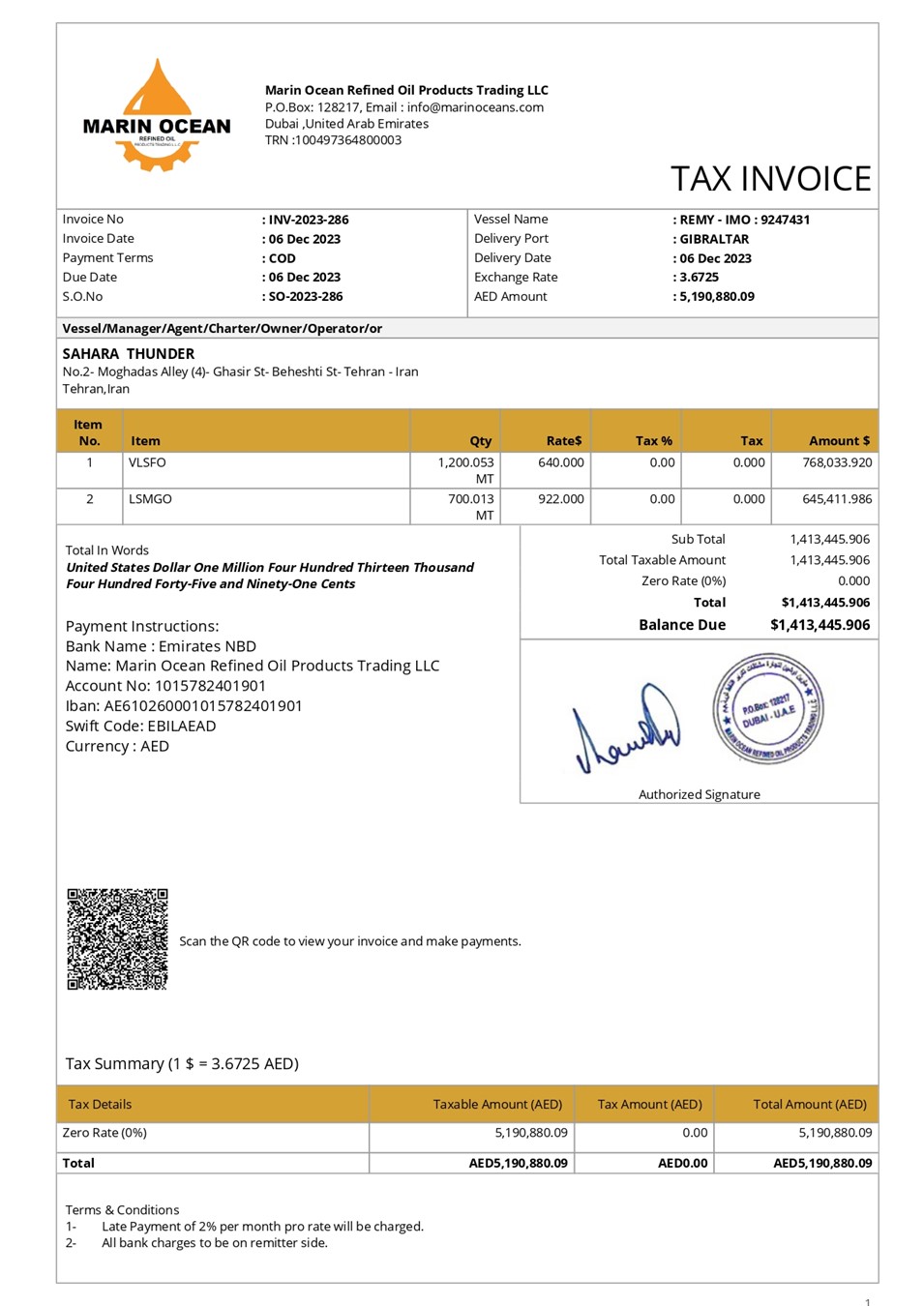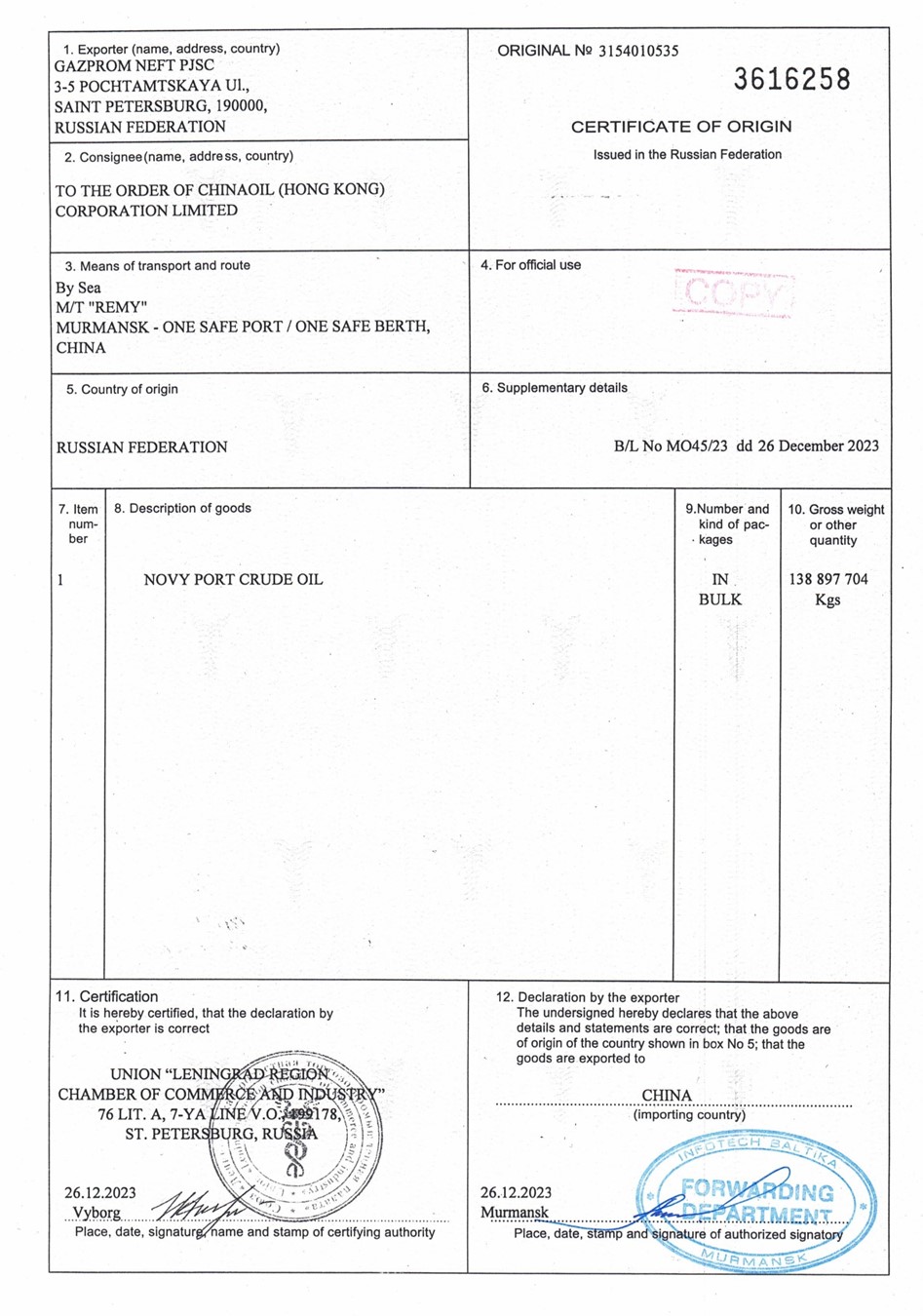February 2024 Iran Tanker Tracking
The striking divergence between U.S. oil policy on Russia versus Iran was borne out again this month.
On February 23, the U.S. levied sanctions on Sovcomflot, Russia’s biggest tanker company, including 14 of its crude oil tankers. According to a U.S. Treasury official, “Sovcomflot as a whole, as a parent company, has been implicated in price cap violations in addition to deceptive activity.”
Accompanying the designation was a lengthy written feature published on the Department of the Treasury website, explaining in detail U.S. policy on stemming Russian oil revenues as punishment for Vladimir Putin’s invasion of Ukraine. Also included in the report were multiple graphs showing how U.S. and coalition caps have generated cuts in Russian oil revenues. “Russian oil is the Kremlin’s principal profit source for financing its barbaric invasion,” it noted accurately.
But, the Administration has not published a correspondingly detailed report with respect to Iranian oil exports—despite the equally vital role oil sales play in funding Iran’s malign activities: sponsorship of terrorism, development of WMDs, and domestic repression. There is a conspicuous absence of robust pronouncements and clear-eyed reasoning with respect to Tehran and its oil. This lacuna lays bare the Administration’s reluctance to confront Iran’s evasion of oil sanctions properly.
Over the past three years, Iran has managed to sell $90 billion worth of U.S.-sanctioned oil, setting new export records in the process. This is a regrettable data point that clearly inhibits the publication of Administration reports on Iranian oil, in contrast to February’s report on Russia. Ongoing hesitance to enforce oil sanctions on Iran has proven to be a defining characteristic of the Biden Administration’s foreign policy.
And yet, adopting a stronger stance on Iranian oil exports will also help with efforts against Russian oil exports.
The intertwined nature of Russian and Iranian sanction evasion tactics necessitates a concerted approach to sanctions. Targeting Iran's oil exports is not just about countering Iran's destabilizing activities. It is also a strategic move to close the loopholes that Russia exploits to maintain its oil revenue amidst sanctions. By sanctioning the Iranian oil sector, the U.S. and its allies can disrupt the broader network of evasion that supports Russian oil exports, thereby exerting greater pressure on the Russian economy and its ability to finance its aggression against Ukraine.
Russia and Iran have developed a symbiotic relationship to evade sanctions and monitoring, leveraging a complex network of ship-to-ship transfers, falsified shipping documents, and obscured vessel ownership. This “shadow fleet” enables the clandestine movement of oil. By disguising the origin and destination of oil shipments, Russia and Iran can continue their oil trade, sustaining their economies and financing their threatening activities.
A rigorous and expansive sanctioning regime of direct sanctions on entities involved in the oil trade and a strategic effort to dismantle the network that allows Iran and Russia to collaborate in evading these sanctions is imperative to effectively undermine the financial foundations of the Iranian and Russian regimes. By doing so, the U.S. and its allies can deliver a more significant blow to the economic lifelines that sustain these regimes' adverse actions on the global stage.
In its absence, we will see export figures from U.S. adversaries continue to hit new heights.
|
Country of Destination |
February 2024 - Barrels Per Day (bpd)* |
January 2024 - Barrels Per Day (bpd)* |
December 2023 - Barrels Per Day (bpd)* |
|
China |
1,462,257 |
1,128,893 |
1,182,195 |
|
Syria |
82,867 |
64,922 |
49,365 |
|
UAE |
30,339 |
61,368 |
15,305 |
|
Unknown |
68,966 |
63,633 |
64,516 |
|
Total |
1,644,438 |
1,318,816 |
1,311,382 |
*Figures to be updated over the following weeks
The global oil market has witnessed an unexpected alliance between two of its most formidable players, Russia and Iran, challenging the traditional competitive landscape through a sophisticated partnership aimed at evading international sanctions. A recent development, unveiled by a WikiIran investigation, centers around Sahara Thunder, a corporation now exposed as a front for the activities of Iran's Ministry of Defense (MODAFL).
Documentation, including a letter from Bank Saderat to the CEO of Sahara Thunder, reveals the company as a state-owned entity integral to the MODAFL cooperative of companies, suggesting a deep-seated governmental involvement far beyond mere arms dealings with Russia.
Sahara Thunder's role in orchestrating covert operations for Gazprom, Russia's oil giant, to transport crude oil to China marks a strategic collusion that diverges sharply from the competitive dynamics expected of Russia and Iran. This alliance signifies a deliberate move to sidestep the constraints imposed by international sanctions, highlighting a mutual pivot towards sustaining their economies amidst economic isolation.
The vessel MT REMY (IMO: 9247431) has been a linchpin in these sanction evasion efforts, drawing attention from United Against Nuclear Iran (UANI) as early as 2021. Initially spotted engaging in ship-to-ship transfers with the National Iranian Tanker Company's vessel SEVIN, MT REMY's activities have consistently involved the clandestine movement of oil. By 2022, MT REMY expanded its operations, loading oil from Venezuela's Jose Terminal and engaging in transfers with the infamous Iranian tanker VIRGO (IMO: 9236250). Throughout 2023, MT REMY continued its illicit activities, conducting additional loadings from Iran, with all shipments ultimately destined for China, including notable transfers with vessels such as SONIA I and DUNE.
The culmination of MT REMY's activities in December 2023 underscores the vessel's critical role in facilitating the export of Russian crude oil to China. Leaked documents detail the loading of approximately 900,000 barrels of crude oil from Murmansk, Russia, on December 23, 2023, with Gazprom Neft PJSC as the shipper and China Oil Hong Kong Corporation Limited as the consignee. These documents, coupled with leaked emails, reveal that during this period, MT REMY was leased by MODAFL and operated under the cover of Sahara Thunder, further indicating the vessel's frequent use by Sahara Thunder for transporting Iranian oil.
Despite the vessel’s clear engagement in facilitating transactions for not one, but three countries currently under sanctions, Panama’s persistent flagging of REMY raises serious concerns about its commitment to upholding regulations and combating illicit activities.
Once again, this situation not only calls into question Panama's regulatory oversight and effectiveness in monitoring vessels under its flag but also highlights a troubling complicity in allowing sanctioned or illicit operations to continue unabated. The continued flagging of MT REMY by Panama, in the face of overwhelming evidence of its involvement in sanctioned activities, points to a significant failure in the flag state's responsibilities. It undermines efforts to enforce sanctions and prevent the maritime transport sector from being exploited for unauthorized oil trade.
This intricate web of operations not only highlights the strategic depths to which Iran and Russia will sink to evade sanctions but also underscores the complex challenges faced by the international community in enforcing these sanctions. The collaborative efforts of Russia and Iran, facilitated by entities like Sahara Thunder and vessels such as MT REMY, represent a stark reminder of the ongoing battle against sanction evasion and the need for vigilance and cooperation among nations committed to upholding international law.



Receive Iran News in Your Inbox.
Eye on Iran is a news summary from United Against Nuclear Iran (UANI), a section 501(c)(3) organization. Eye on Iran is available to subscribers on a daily basis or weekly basis.